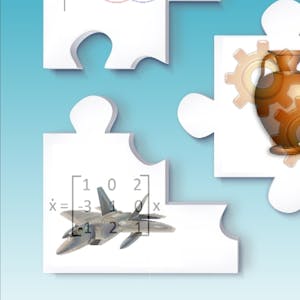Introdução ao Controle Moderno provides a comprehensive understanding of advanced control techniques in modern engineering. This course equips learners with the essential knowledge to represent system dynamics in state-space, analyze systems in state-space, design state feedback, and implement state observers.
The course begins with an overview of the necessity and advantages of modern control, leading into the fundamentals of state-space representation and modeling. Learners delve into the analysis of state-space models, exploring solutions to state equations, eigenvalues, and eigenvectors. Subsequently, the course delves into the design of regulation and tracking in state-space, covering topics such as controlability, integral action, and state observers. Practical implementation in MATLAB and Simulink is integrated throughout the coursework, providing hands-on experience in modeling and simulating state-space systems.
Certificate Available ✔
Get Started / More Info
Introdução ao Controle Moderno covers the essentials of state-space representation and control, from introductory concepts to advanced design and implementation in MATLAB and Simulink.
The introductory module provides an overview of the course, including the necessity and advantages of modern control and the basics of state-space representation. Learners gain practical experience in using MATLAB and Simulink for control system analysis and design, setting the foundation for subsequent modules.
Module 2 focuses on state-space modeling, covering the representation of electrical and mechanical systems in state-space. Learners explore the transition from state-space to transfer function, linearization, and the implications of infinite realizations in state-space. Practical examples and evaluations deepen understanding.
Module 3 delves into the analysis of systems in state-space, elucidating solutions to state equations, eigenvalues, and eigenvectors. Learners examine the relationship between poles and eigenvalues, and reinforce knowledge of step response formulas. The module concludes with a comprehensive evaluation.
Module 4 shifts focus to the design of regulation in state-space, covering topics such as controlability, design verification, and examples of non-controllable circuits. Learners engage in practical evaluations to reinforce their understanding of regulation design in state-space.
Module 5 explores the design of tracking in state-space, incorporating integral action and practical examples to reinforce learning. Learners delve into the determination of gain adjustments, further enhancing their skills in state-space control design.
Module 6 introduces the concept of state observers, covering their principles, duality, and pole selection. Learners gain insights into observability and engage in a practical observer design example. The module concludes with a comprehensive evaluation.
Module 7 focuses on the practical implementation of modern control techniques in MATLAB and Simulink. Learners revisit MATLAB applications, state-space modeling, analysis, and the implementation of state feedback and observers. The module culminates in a final project, integrating all learned concepts for a holistic understanding.
Electrónica en cápsulas ofrece 3 cursos de electrónica analógica de nivel universitario. Aprende sobre fundamentos, diodos, transistores, y aplicaciones interesantes...
Incrementar - Parte 2 y Controlar: A comprehensive exploration of Lean Six Sigma's DMAIC methodology, focusing on improvement and control stages through quantitative...
Explore fluid mechanics using Wolfram notebook to compute pressure, buoyancy, fluid flow, Venturi flowmeter, and barometric pressure.
Transistor - Field Effect Transistor and Bipolar Junction Transistor course covers the in-depth analysis of metal-oxide-semiconductor field effect transistors (MOSFETs)...